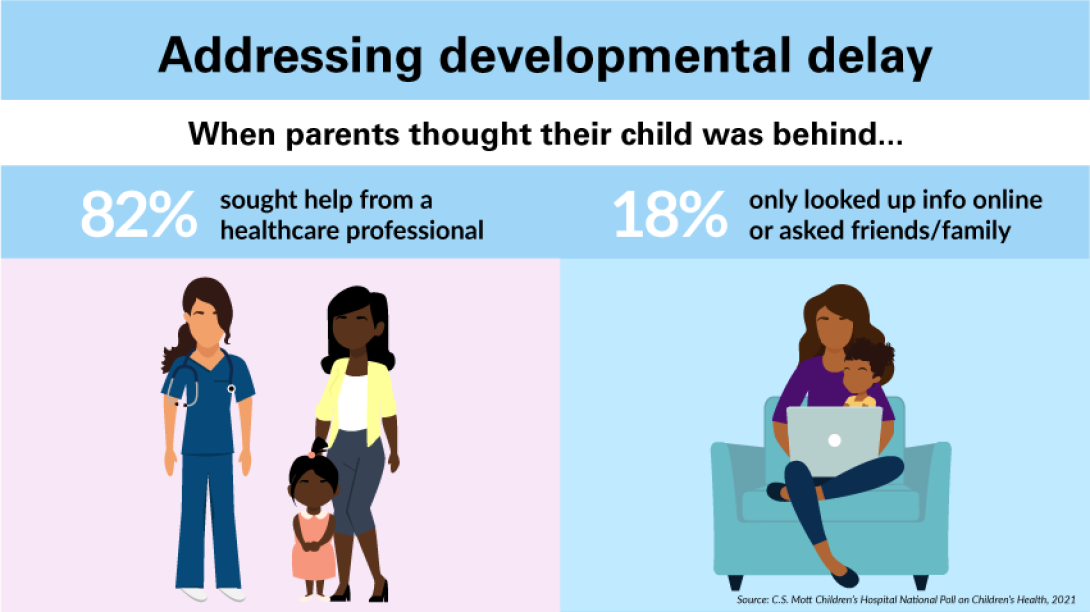While a quarter of parents have worried about their child’s development, some turn to the web, family and friends or social media instead of a doctor.
8:27 PM
Author |

As their infants and toddlers grow, many parents may wonder if their children are walking, talking and socializing when they're supposed to be.
In fact, nearly a quarter of parents have suspected their child might be delayed in their development, a new national poll found – but they may not always share these concerns with a doctor.
Among parents who worried that their child was behind in hitting their milestones, nearly one in five did not seek advice from a healthcare or childcare provider, according to the University of Michigan C.S. Mott Children's Hospital National Poll on Children's Health.
"Parents may be unsure whether their child is progressing appropriately for their age and are on track with peers," said co-poll director and Mott pediatrician Gary L. Freed, M.D., M.P.H. "While most do seek a professional's advice, some parents may turn to potentially less reliable sources, like friends or online content."
The majority of parents felt confident in knowing when children should achieve most of their developmental milestones, according to the nationally-representative report based on responses from 779 parents with at least one child five or under.
And more than 80% of those who suspected their child was behind asked for advice from either healthcare providers (63%) or childcare providers (24%).
Still, another 18% only looked up information online, asked family or friends or sought advice on social media. Parents who have worried their child might be delayed are also more likely to learn about milestones from the internet than parents who haven't had these concerns.
"When parents seek advice from friends, family or social media, they may hear inaccurate or outdated information about what's expected during different stages of development," Freed said.

One in three parents also said they've compared their children to a friend's child and a similar number said they compared siblings. Dads were more likely than moms to have compared their child to friends' children (41% vs 28%) or to other children in their family (32% vs. 25%.)
Freed noted that while most milestones typically take place during predictable windows, there's a range of normal for gaining certain skills like walking, talking or laughing.
"It's important for parents to keep in mind that child development is a process that unfolds over time. Each child is unique," he said. "Some children might reach certain milestones earlier or later than same-age peers. This doesn't necessarily mean that one child is advanced or that another is delayed.
Like Podcasts? Add the Michigan Medicine News Break on iTunes, Google Podcast or anywhere you listen to podcasts.
It's important for parents to keep in mind that child development is a process that unfolds over time. Each child is unique.Gary L. Freed, M.D., M.P.H.
Sometimes parents aren't the first to notice potential developmental concerns in their child, according to the poll, with some hearing about it from family members (9%), healthcare providers (9%) or friends (4%).
But if parents have any questions about a child's physical, social/emotional, communication, and cognitive skills, they should ask an expert, Freed said. Healthcare providers will check on a child's progress during well-child visits asking about such developments as rolling over, smiling at a parent, babbling or responding to facial expressions.
For some children, such as those born premature, expectations about the timing of developmental milestones will also need to be adjusted, Freed noted.
"Checking and monitoring developmental milestones can be helpful in detecting delays or problems early and assessing whether children need additional support," Freed said.
"For many parents, well child visits are the best time to discuss age appropriate milestones and to learn what to be looking for by the next checkup."

Explore a variety of healthcare news & stories by visiting the Health Lab home page for more articles.

Department of Communication at Michigan Medicine
Want top health & research news weekly? Sign up for Health Lab’s newsletters today!





